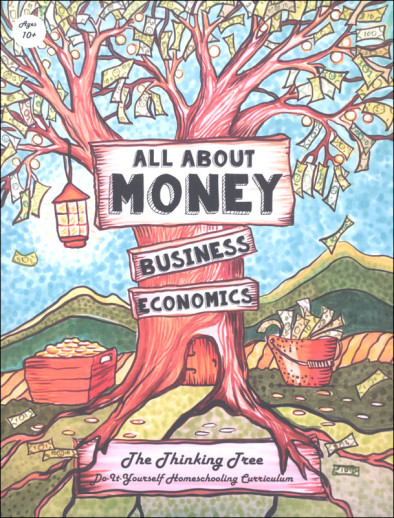We use cookies to make your experience better. To comply with the new e-Privacy directive, we need to ask for your consent to set the cookies. Learn more.
All About Money Business Economics
Guiding students through a study of money, budgets, wages, taxes, basic economics, and the impact of challenging events on finances, this Thinking Tree “Do It Yourself" homeschooling curriculum is very comprehensive! The text recommends Whatever Happened to Penny Candy (item # 009411) by Richard Maybury as a companion book, along with library and internet resources that you select. If you are familiar with other Thinking Tree resources, this has a similar format with template pages to document learning. Additionally, introductory information is included for some lessons. Brief explanations are provided for currency and budgeting, debt, ways people earn money, investments, the government, economic resources, distribution, inflation, depression, recession, the economy and the law. Students are directed to learn more through independent online research including You-Tube® searches. Depending on the child's age/maturity, parents may wish to assist or supervise online activity. The concluding chapter presents an interesting look at the impact of events on the economy. Acting as investigative reporters, students research and write about numerous events and their impact on our daily lives, businesses, and economy. Covered are the Great Depression, Spanish Flu of 1918, World War II, London's Great Plague of 1665, and the Covid-19 Pandemic. A great resource for guided learning that fits the needs of families wanting more control and flexibility in their studies.
This book covers many important topics regarding Business, Economics, Government and even Pandemics and the impact of war on an economy.
After studying how money works, the student will have a chance to dig into history to understand plagues, pandemics, depressions and wars. They will be able to have a strong understanding of how these events impacted nations throughout history, and how these events impact us today.
There is also an exciting section on current events and the impact COVID-19 is having on our lives, businesses, schools, churches, government, community… and the ability to buy enough toilet paper!
At the end of the book the student will study different events in history and write news articles about each event showing how the events impacted the economy, families and communities. At the end of the book the student will write about a new idea for a business, that a kid could start, during a pandemic.
This book is essential to equipping your child to understand money from a much higher level than most citizens. If your child grows up understanding how the world works and how to thrive during troubled economic times, he or she will have a great chance at success in life!
| Product Format: | Paperback |
|---|---|
| Brand: | The Thinking Tree |
| Grades: | 5-8 |
| ISBN: | 9798629450993 |
| Length in Inches: | 11 |
| Width in Inches: | 8.5 |
| Height in Inches: | 0.375 |
| Weight in Pounds: | 0.9 |

